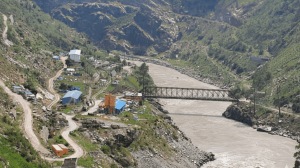Why are Punjab women getting stuck in Arab countries they go to for work
"It is a racket in which unscrupulous agents are earning big bucks from Saudi people by selling these women,” said a senior officer in the Ministry of External Affairs (MEA), requesting anonymity.
 Most such women are either illiterate or semi-literate, and majority belong to Dalit families living in harsh conditions here.
Most such women are either illiterate or semi-literate, and majority belong to Dalit families living in harsh conditions here.
With AAP MP Bhagwant Mann highlighting the case of 11 women from Punjab who have sent an SOS from Muscat, the capital of Oman, asking authorities in India to help them return home, the focus is back on women taking up jobs in Arab countries and getting stuck. ANJU AGNIHOTRI CHABA explains why so many women from the state keep walking into the trap.
Is this a new trend?
Though men from Punjab have been going for work to Arab countries for decades, this trend among Punjabi women is new. Punjab has never seen women going abroad alone for work. It is being seen as a new emerging menace of female human trafficking from Punjab by unscrupulous travel agents. The trend also shows a social shift, claim activists.
When did these cases start coming into limelight?
It was in April 2017 when an SOS went viral on social media in which a Punjabi woman was seen crying incessantly and pleading, “Please rescue me from here, save me, bring me back otherwise they will kill me. They beat me badly, don’t give me food, lock me in a room and I am very sick.” A Jalandhar-based woman had sent that video from a city in Saudi Arabia. After this, a series of similar messages came out in the open, following which around a dozen women were rescued by the Centre. All these women, who hailed from Doaba region, the NRI belt of the state, had gone there to work as housemaids.
But recent case reveals that women from other regions of the state are also falling prey to this menace. Out of 11 women, 7 are from other regions of Punjab including Malwa region.
What is the background of these victims?
All of them are either illiterate or semi-literate, and majority belong to Dalit families living in harsh condition here. They take up these jobs to improve the poor economic condition of their families. In most cases, they are taken on a 90-day tourist visa, which according to their agents would be extended for two years. They are promised a salary of Rs 21000-22000 monthly.
In every case, a local acquaintance from their village or area has been found to have led them to local women agents who had some connection with Delhi-based agents, including a woman agent named Neha, according to police records.
Akwinder Kaur, who was rescued from Saudi Arabia, said, “A girl, Neelam, from my village had gone to Saudi Arabia and offered me to come there as house maid. She told me that I will get Rs 20,000-22,000 for doing 4-5 hours household work….My husband, who is partially blind and earns just Rs 5,000, allowed me and we paid Rs 40,000 to the person Neelam asked us to pay.” She added that another woman agent got her thumb impression on some paper as she does not know how to write. “My only aim was to give a good life to my children,” she said.
What difficulties do these workers face in Arab countries?
Most of them are forced to work 16-17 hours in a day. They are not allowed to call home and even forced to live in inhuman conditions and are sold from one household to other by local agents. Some are jailed and even abused physically. Also, their salaries are held back for months, while their families are already under stress back home due to debt they have taken to send them abroad. Most of them pay Rs one lakh to Rs 2.5 lakh to take such jobs.
What do registered travel agents say about this trend?
“All our registered travel agencies send youth on study and work visas but hardly anyone is sending women labourers to Saudi or any other country,” said a senior member of Association of Consultants for Overseas Studies, a registered body of travel agencies in Doaba. He said that they have launched several awareness programmes but still unscrupulous travel agents are quite successful in alluring poor women.
What do families of these women say?
The families back women taking up these jobs, but add that the Union government should ensure safety of its citizens who go abroad for work.
What does the police say?
An SSP from the Doaba region said that they are looking into all such complaints and have arrested few local agents and one Delhi-based agent Shakil Khan. He advised people to verify the antecedents of agents before taking up a job abroad. A senior police officer said these women are sold by local agents to their employers in Arab countries as slave labour at the rate of Rs 2 to 3.50 lakh.
What is the MEA’s view?
MEA sources informed that the ministry has been making all efforts to bring the issue to the notice of respective Arab governments. “In the past one year, the agents have been able to send over a couple of dozen women from Punjab and Indian embassy in Riyadh was also aware about it. It is a racket in which unscrupulous agents are earning big bucks from Saudi people by selling these women,” said a senior officer, requesting anonymity, in Ministry of External Affairs (MEA).
People at Saudi Embassy in New Delhi revealed that incidentally, there is a growing demand for such household workers in Saudi Arabia and other Arab countries and travel agents are taking advantage of it.
What do social activists make of the trend?
Gian Chand, member of Punjab SC/ST Commission and general secretary of Samaj Sewa Trust as well as prominent Dalit leader frim Doaba, said such immigration of women folk indicates a vulnerable condition of their families here and only poverty is forcing them and their families to send women alone abroad for work. He said that they will take up the matter with government.
- 01
- 02
- 03
- 04
- 05






































